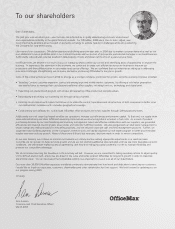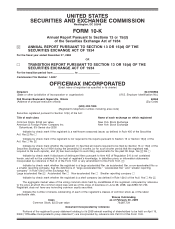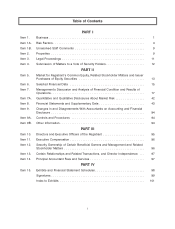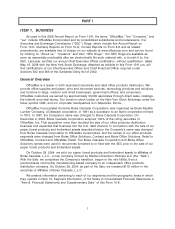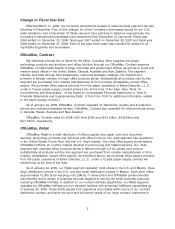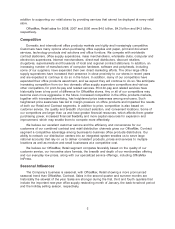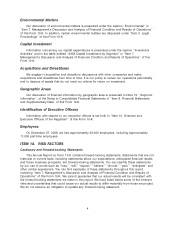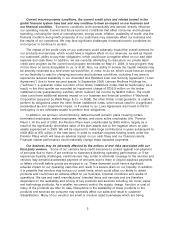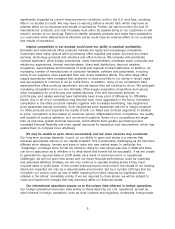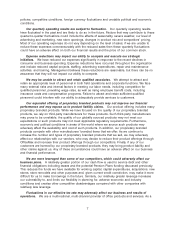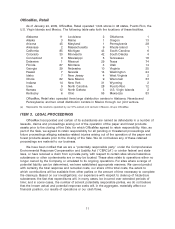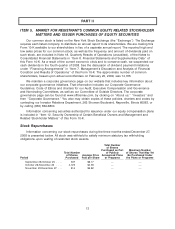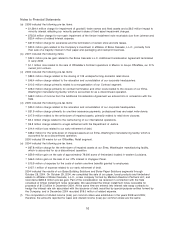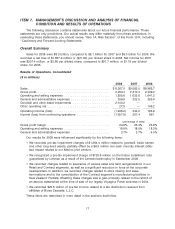OfficeMax 2008 Annual Report Download - page 12
Download and view the complete annual report
Please find page 12 of the 2008 OfficeMax annual report below. You can navigate through the pages in the report by either clicking on the pages listed below, or by using the keyword search tool below to find specific information within the annual report.result, our effective tax rate is derived from a combination of applicable tax rates in the various
countries, states and other jurisdictions in which we operate. Our effective tax rate may be lower or
higher than our tax rates have been in the past due to numerous factors, including the sources of
our income, any agreements we may have with taxing authorities in various jurisdictions, and the
tax filing positions we take in various jurisdictions. We base our estimate of an effective tax rate at
any given point in time upon a calculated mix of the tax rates applicable to our company and to
estimates of the amount of business likely to be done in any given jurisdiction. The loss of one or
more agreements with taxing jurisdictions, a change in the mix of our business from year to year
and from country to country, changes in rules related to accounting for income taxes, changes in
tax laws in any of the multiple jurisdictions in which we operate or adverse outcomes from tax
audits that we may be subject to in any of the jurisdictions in which we operate could result in an
unfavorable change in our effective tax rate. This unfavorable change could have an adverse effect
on our business and results of our operations.
Compromises of our information security may adversely affect our business. Through our
sales and marketing activities, we collect and store certain personal information that our customers
provide to purchase products or services, enroll in promotional programs, register on our website,
or otherwise communicate and interact with us. We also gather and retain information about our
associates in the normal course of business. We may share information about such persons with
vendors that assist with certain aspects of our business. Despite instituted safeguards for the
protection of such information, we cannot be certain that all of our systems are entirely free from
vulnerability to attack. Computer hackers may attempt to penetrate our networks or our vendors’
network security and, if successful, misappropriate confidential customer or business information. In
addition, a Company employee, contractor or other third party with whom we do business may
attempt to circumvent our security measures in order to obtain such information or inadvertently
cause a breach involving such information. Loss of customer or business information could disrupt
our operations and expose us to claims from customers, financial institutions, payment card
associations and other persons, which could have a material adverse effect on our business,
financial condition and results of operations.
We cannot ensure systems and technology will be fully integrated or updated. At the time
of our acquisition of OfficeMax, Inc., in December 2003, we partially integrated the systems of the
two companies. Integrating these systems was complex and we have no current plans to complete
the integration. This may constrain for some time our ability to provide the level of service our
customers demand and could cause us to operate inefficiently. Failure to complete the integration
of these systems or install necessary updates could have an adverse effect on our business and
results of our operations.
We retained responsibility for certain liabilities of the sold paper, forest products and
timberland businesses. These obligations include liabilities related to environmental, health and
safety, tax, litigation and employee benefit matters. Some of these retained liabilities could turn out
to be significant, which could have an adverse effect on our results of operations. Our exposure to
these liabilities could harm our ability to compete with other office products distributors, who would
not typically be subject to similar liabilities. In particular, we are exposed to risks arising from our
ability to meet the funding obligations of our Pension Plans and withdrawal requests from
participants pursuant to legacy benefit plans, each of which could require cash to be redirected and
adversely impact our cash flows and financial results. Finally, the Company has various outstanding
industrial revenue bonds. Certain of those bonds received a preliminary adverse determination
regarding the exempt status of interest on the bonds from the Internal Revenue Service (‘‘IRS’’).
The Company has appealed the proposed IRS determination. If the adverse determination is
upheld, the Company will call the bonds and will be subject to certain other payment obligations,
which will adversely impact our cash flows and financial results. There can be no assurance that
8


